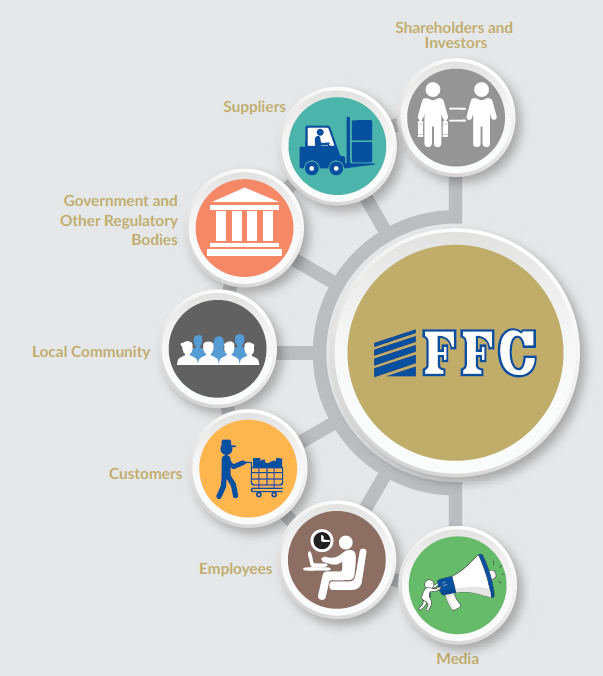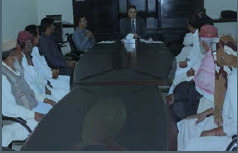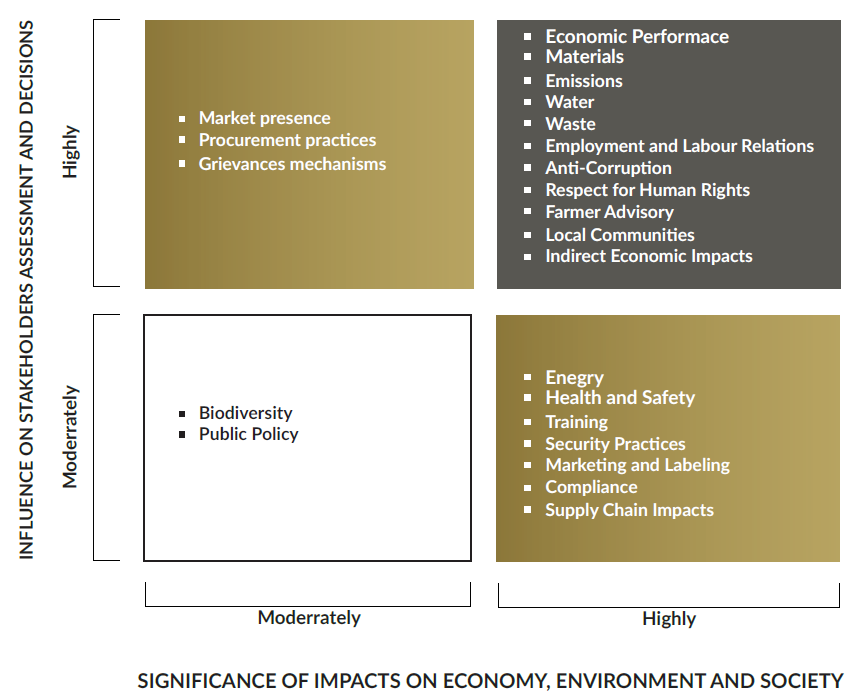Fauji Fertilizer Company Limited is a public listed company with its business across Pakistan. Headquartered at Rawalpindi with marketing group office at Lahore, manufacturing plants at Goth Machhi, and Mirpur Mathelo, we are one of the leading fertilizer manufacturers in Pakistan. We manufacture and market our own as well as associated company’s fertilizers in Pakistan. In addition to marketing of locally manufactured fertilizers Urea and DAP under the name Sona, we also import DAP, SOP, MOP, Boron and Zinc which are marketed as FFC DAP, FFC SOP, FFC MOP, Sona Boron and Sona Zinc.
Our net revenues for the year 2016 were Rs. 72.87 billon with net profit of Rs. 11.78 billion. Total capitalization was Rs. 90,709 million with owner equity of Rs. 28,211 million. During the year, there were no significant changes in size or capital structure. We market and sell products throughout Pakistan covering all four provinces. Our products are used mainly in the agriculture sector. The products are shipped to dealers, institutional customers and direct customers. FFC does not sell any product that is banned in certain markets or that is subject of stakeholder questions or public debate. Our market network includes 3 zones, 13 regions, 63 sales districts, 194 warehouses, over 3,700 dealers and five farm advisory centers which are spread in all four provinces of Pakistan to cater product sales and farm advisory services.
We require raw materials, packaging, capital equipment, services, and other inputs. Our suppliers consist of local suppliers and foreign suppliers, including large companies, small privately held companies, contractors and small businesses. The major raw material and other components procured locally while the materials and components which are not available in Pakistan are purchased from abroad. We are not particularly dependent on any of our suppliers. Our supply chain is mixed including labor intensive and technology intensive. The total number of our suppliers was 3,123 at the end of the year. During the year, we paid Rs. 24,258 million to our supply chain partners on account of purchases of goods and services. We have an extended network of dealers for provision of product to customers at their nearest point. There were no major changes in the location, operations, and structure of the organization and its supply chain during the year.

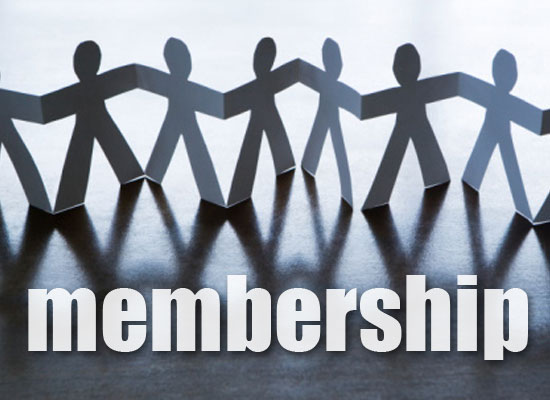
- United Nations Global Compact (UNGC)
- Marketing Association of Pakistan (MAP)
- Fertilizer Manufacturers of Pakistan Advisory Council (FMPAC)
- Fertilizer Industry Public Relation Committee (FIPRC)
- International Fertilizer Industry Association
- Arab Fertilizer Association
- Farmers Association of Pakistan
- World Wide Fund (WWF)
COMMITMENTS, MEMBERSHIPS AND AWARDS
We, being a responsible corporate citizen, not only abide legal obligations but also strive to follow several externally developed voluntary initiatives in the areas of economic, environment and social management. We support the Sustainable Development Goals (SDGs) as agreed between the nations and foresee it a step forward to resolve the world’s most critical issues and support an active role of business in helping the governments to meet the targets.
We do not provide substantial funding to these associations. However, events like exhibitions/seminars/workshops are sponsored. We remain engaged with these organizations on a continuous basis and actively take part in activities related to us. Our Agri. Services officers are members of the Soil Science Society of Pakistan and the annual subscription for each officer is borne by FFC. Moreover, our R&D officials also hold honorary positions with international research organizations like University of Nottingham, British Geological Survey, and Society for Environmental Geochemistry and Health (European Chapter). We participate in conferences, seminars & events organized by the Soil Sciences Society of Pakistan and give our input in public policy development.

Awards
- Best sustainability report 2015 award by the joint committee of ICAP and ICMAP
- First position for best presented annual report 2015 in SAARC region by SAFA
- Best presented annual report 2015 award by ICAP and ICMAP
- Excellence certification for “Protect & Sustain” from the International Fertilizer Industry Associations (IFA)
- First company to consecutively win six first position placements in PSX Top 25 Companies Award
- Co-winner in the “Large National Category” of the Business
- Excellence Awards of UNGC (Pakistan Network)
- Management Excellence Award by the Management Association of Pakistan
- Platinum award by Rawalpindi Chamber of Commerce and Industry
MATERIALITY ASSESSMENT
We aim to create value addition and benefits to all stakeholders through timely identification, prioritization and management of impacts, risks and opportunities. Our sustainability efforts are focused in areas which represent our significant impacts on the economy, environment and society, critical for our ability to create value over short, medium and long term and which have been defined as important by various stakeholders.
We used GRI Standard GRI 101 Foundation 2016 reporting principles of sustainability context, materiality, completeness and stakeholder inclusiveness, for defining our report contents. These principles have been consistently applied at varying degrees during identification, prioritization and validation steps, while defining material topics for this report.
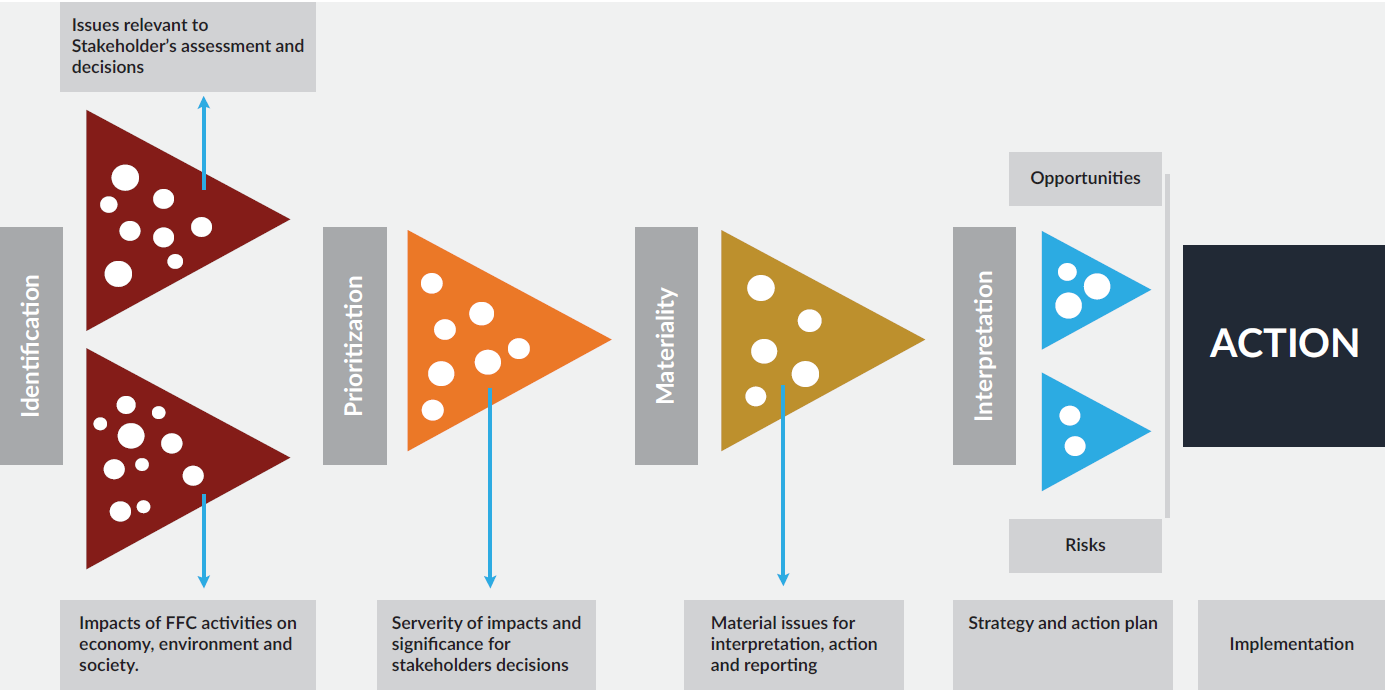
Based on the results of the stakeholder engagement, review of industry specific issues, and internal analysis, a materiality analysis was carried out to produce a materiality matrix containing the material sustainability issues for our operations. This analysis has allowed us to identify the most relevant topics that reflect significant economic, environmental and social impacts and that greatly influence our value creation ability and the assessments and decisions of our stakeholders. The prioritization of the risks is based on the materiality analysis for non-financial risk as per IR framework, GRI Standards and best available practices for defining material topics. Through the materiality analysis, we consider the severity and likelihood of such a potential risk, and establish relative risk levels to guide our mitigation activities. The CSR Committee analyzes the risk identified and recommends action to the relevant departments for prevention and mitigation of the negative impacts of the operations and maximization of opportunities. Compliance with laws, international standards, internal regulations, and FFC’s code of conduct is a basic requirement for all activities as part of the precautionary approach. The validation of material topics was carried out by CSR Committee which is responsible for sustainability related activities. The GRI Standard GRI 101 Foundation 2016 principles of defining report content i.e. completeness and stakeholder inclusiveness were applied while validating the material topics for the FFC 2016 sustainability report.




